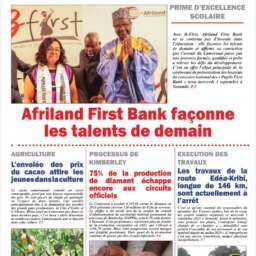(Business in Cameroon) – The International Monetary Fund (IMF) and the Cameroonian government have reached a staff-level agreement for a new financial package totaling over 82 billion CFA francs. This includes 45.3 billion CFA francs under the Extended Credit Facility (ECF) and Extended Fund Facility (EFF), along with 42 billion CFA francs from the Resilience and Sustainability Facility (RSF). This financial support, however, still needs approval from the IMF Executive Board.
In a statement released on July 7, 2025, the Bretton Woods institution indicated that the staff-level agreement followed the eighth review of the ECF/EFF programs and the third review of the RSF program. Therefore, the disbursement of these funds depends on the formal completion of these reviews and final approval by the IMF Board.
Before any money is disbursed, Cameroon must show it is meeting the structural commitments it made under its agreements with the IMF. The ECF and EFF programs, launched in 2021, initially totaled 413 billion CFA francs. In December 2023, these programs were extended by 12 months, until July 28, 2025, due to implementation delays and external shocks. This extension also came with an additional 88 billion CFA francs, showing the IMF’s willingness to support Yaoundé while still expecting results.
“The 12-month extension will allow more time to implement the policies and reforms outlined in the agreements,” the IMF stated back in December. The institution stressed that these measures must align with Cameroon’s committed 2030 National Development Strategy (SND30).
After an IMF mission in Yaoundé from April 30 to May 8, 2025, mission chief Cemile Sancak praised the progress Cameroon has made in carrying out a “broad structural reform program.” According to her, about 40 structural benchmarks have been met so far.
However, she emphasized the need for more effort, particularly in restructuring SONARA, completing strategic infrastructure projects, and strengthening the financial sector. Fully implementing the National Financial Inclusion Strategy and the Financial Sector Development Strategy also remain top priorities.
Climate Progress Noted
Regarding the Resilience and Sustainability Facility, which was approved in January 2024 for an initial 110 billion CFA francs over 18 months, the IMF noted Cameroon’s progress in preparing for climate challenges. The country has developed a climate action framework, put in place adaptation and mitigation measures, and completed most of the four major reforms planned under this framework.
These advancements include adopting a national climate plan, establishing guidelines for climate assessments of investment projects, and developing a national disaster risk financing strategy.
While Cameroon shows a willingness to reform and has made some progress, the disbursement of new tranches depends on strict adherence to the commitments made. For the IMF, the program’s credibility now hinges on the country’s ability to turn its commitments into tangible and measurable actions.
Beyond the staff-level agreement and the announced amounts, this reflects the ongoing partnership between Yaoundé and the Bretton Woods institution. This partnership is set against a backdrop of persistent structural challenges and increasing demands for better governance, transparency, and economic and climate resilience.
Ludovic Amara

































